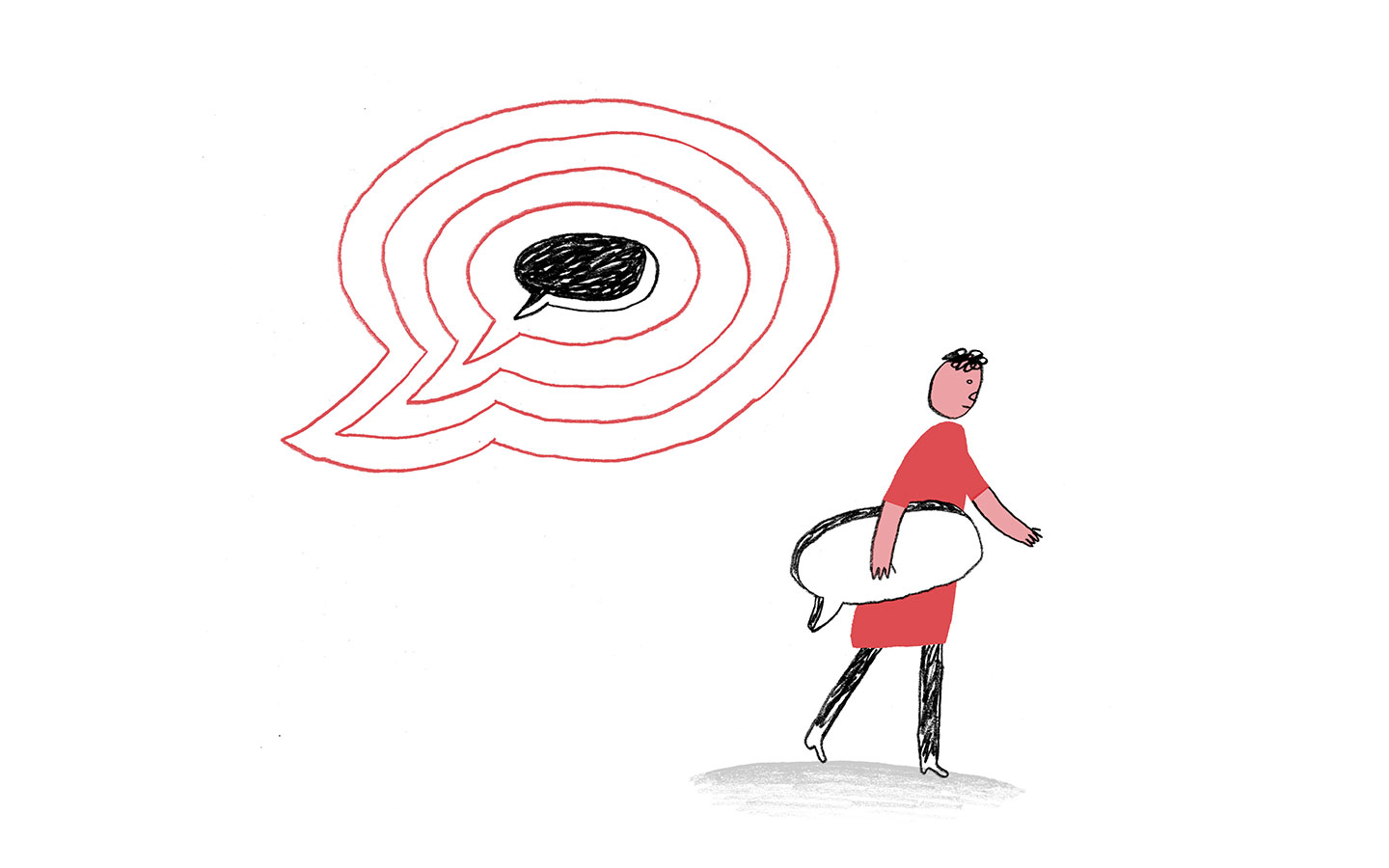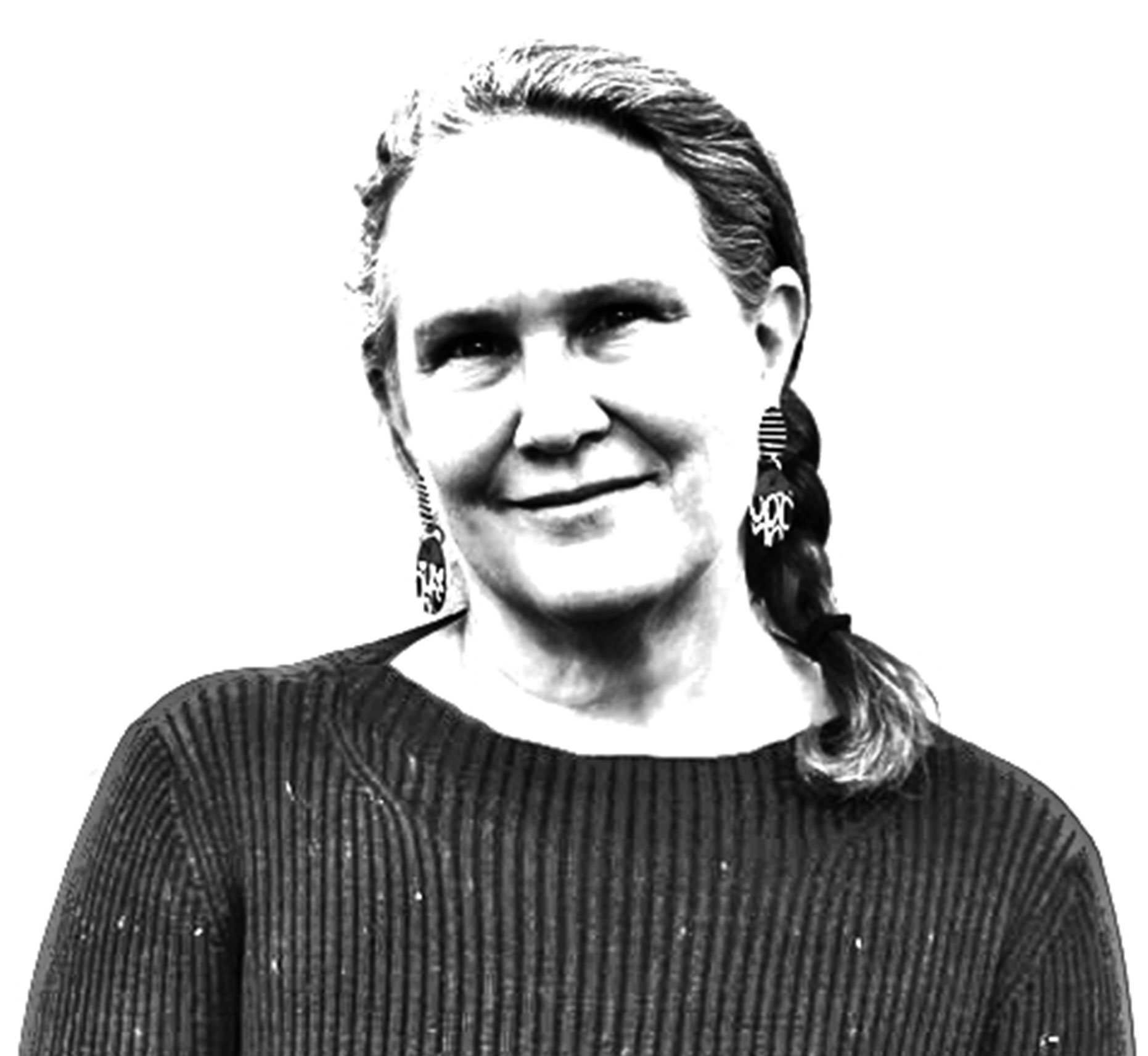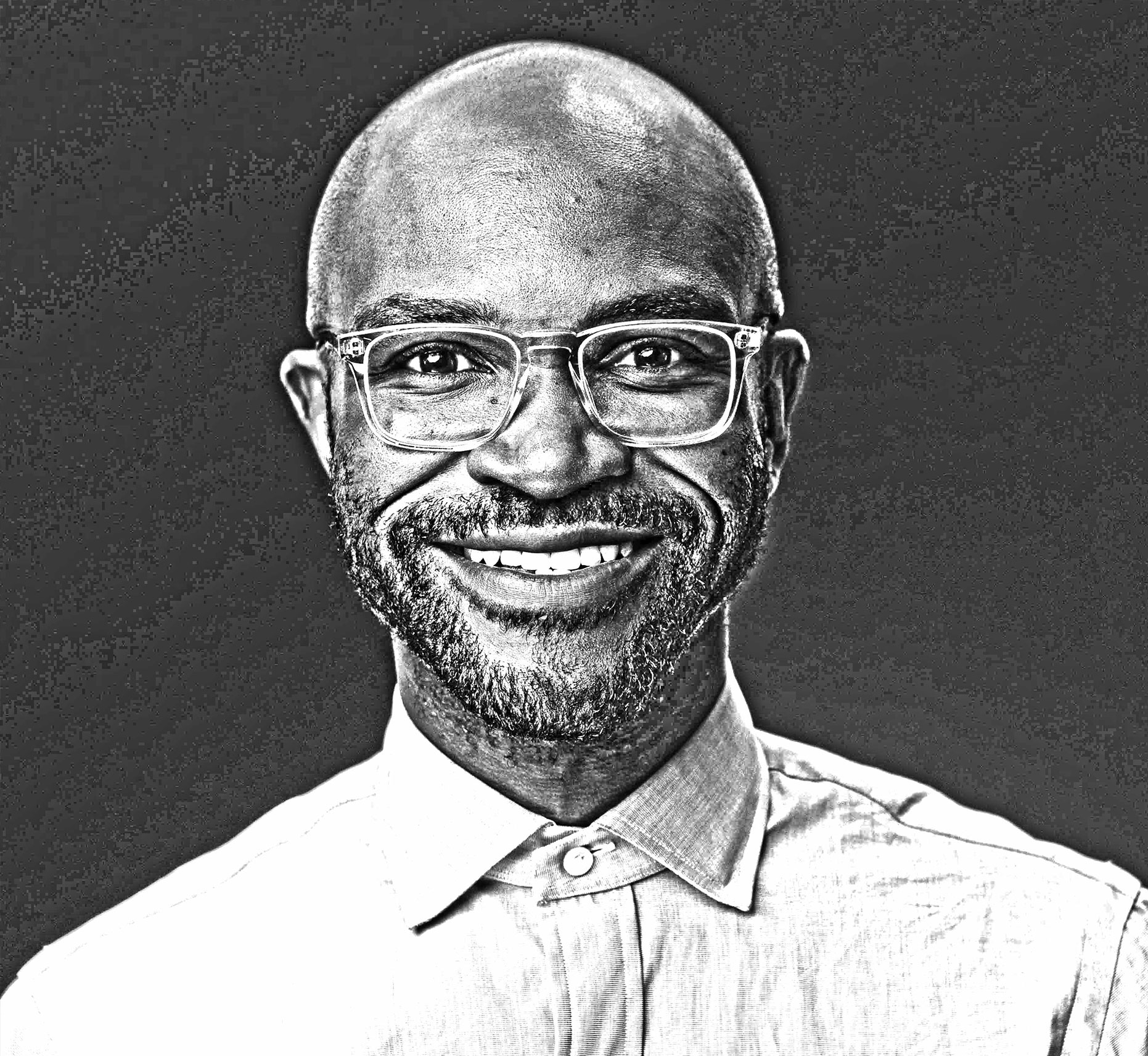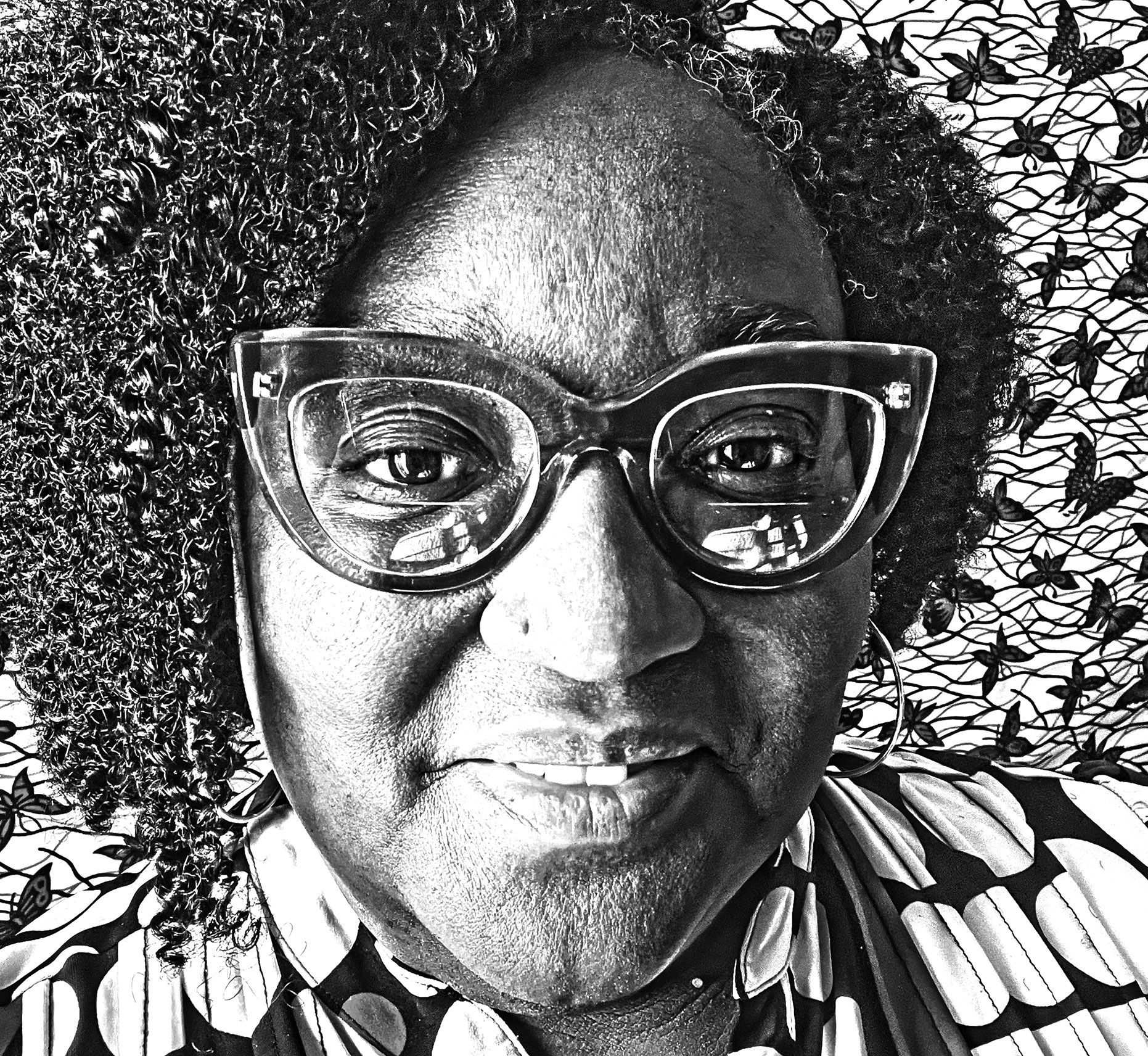Business is Blooming
A conversation with Mailchimp colleagues Michael Mitchell '03 and Lain Shakespeare '05.
Read The StoryKenyon alumni and faculty explore how to become better communicators.
Story by Erin Peterson | Illustrations by Brian Rea
You’ve been meaning to have that conversation.
Maybe it’s a meeting with your boss about a raise or more work-from-home flexibility. Maybe it’s talking with your partner about how household tasks or dollars are divided — or not divided. Or perhaps it’s a discussion with your neighbor about late-night (or early morning) noise.
While some of us look for ways to put off potentially tricky conversations, others seem to manage them with relative ease. What’s their secret?
As with most skills, there’s no secret, just technique and practice. We talked with Kenyon experts who spend their days having — and teaching others to have — high-stakes conversations. It turns out that the techniques they use in classrooms, conference rooms, even at the negotiating table, can help us navigate the twists and turns of not-so-everyday conversations.
Why are we having this conversation, anyway?

Political science professor David Rowe knows that students in his classrooms have diverse perspectives and can debate nearly any topic with relative ease. He relishes these wide-ranging conversations.
But when he teaches some classes, he knows that it’s his job not simply to moderate a lively exchange of views, but to help students understand tricky and sometimes counterintuitive ideas. That requires him to maintain a crystal-clear sense of purpose.
“I’m always asking myself: what’s the goal here? In a seminar, my purpose is to facilitate a conversation that leads students to understand a set of points,” he said. “Whenever I have a decision to make about how to phrase a question or make a statement, that purpose guides how I act.”
Take, for example, a class he teaches on the moral logic of terrorism. “We often think of terrorism as nihilistic and immoral,” he said.
“But (I want to help students understand that) the people who engage in terrorism are actually working within a moral framework. We may not agree with that framework, but just saying, ‘You’re violating my moral beliefs,’ hampers our ability to understand their motivations and actions.” To help students comprehend this surprising idea, they discuss texts from authors including Nelson Mandela, who make compelling points about why people in desperate situations might feel that they have no other choice but to commit acts of terrorism. Considering such ideas — from a Nobel Peace Prize winner, no less — can feel wildly disorienting to students, who pepper Rowe with questions and counter-points to explore the cognitive dissonance they feel. He carefully guides the conversation to help illuminate the underlying concepts with clarity.
That paradigm-shifting experience, he said, is a hallmark of a classic liberal arts education, and it definitely doesn’t happen by chance. It’s possible because Rowe has an intentional goal that he is aiming at from the very beginning.
He knows he has succeeded in this aim when his students file out of the classroom looking a little shell-shocked. “The best class is one where everyone is silent at the end, because their worldview has been turned upside down,” he said. “It means that their prior intuitions haven’t simply been confirmed — it’s changed the way they think about the world.”
Too often, international conflict management specialist Jim Tull ’85 says that we go into what could be a meaningful conversation without a clear purpose. “You’ve got to have a more sophisticated strategy than ‘I’m going to wait and see what happens, then react in kind,’” said Tull.
While your exact purpose can be almost anything — to solve a school policy that affects your kids, to learn something new, to change someone’s mind, to understand how someone sees the world — “you need to be clear about your goal if you want to achieve it. And that includes being honest with yourself,” he said. “If you find yourself thinking about a goal like,‘ I want to prove how stupid he is’, that conversation can quickly go off the rails.”
If you want a discussion to be about understanding someone else’s view rather than changing it, two good things tend to happen, says Tull: first, you might learn something new. Second, you model a willingness to learn that tends to make people more open to learning from you. You actually become more persuasive in your conversation.”
Careful planning can help you achieve your larger conversational goals.

In 2020, Kelley Ukhun ‘92 led a group of Kenyon alumni in a series of “Kourageous Conversations” about race and equity.
In many ways, she was particularly well-suited to the role: she is an educator by trade and talks regularly with friends about race. Still, she knew that the stakes were high at a moment when the entire world was focused on George Floyd’s murder — and she did meticulous planning to make sure the the conversations were as effective as they could be.
To prepare, she re-read a book from graduate school, Glenn E. Singleton’s “Courageous Conversations.” Then she methodically mapped out what became a 14-month series of Zoom discussions. She helped participants explore concepts including white privilege, and led them through activities such as writing racial biographies.
Participants didn’t just learn: they took each discussion’s lessons to the world beyond the screen by supporting voting drives and having similar conversations with their families and friends.
Being part of a larger transformation in participants’ lives, Ukhun said, was a payoff well worth the significant investment of her time and energy. “It was one of the most uncomfortable things I’d ever done in my life,” Ukhun acknowledged. “But it was also one of the most healing (experiences) that I’ve had.”
When clinical psychologist Erin Billie Cooper ’04 helps her patients navigate sensitive relationship issues , she often encourages them to prepare for those conversations in an unexpected way: “I often recommend that people write a letter to that person,” she said. “It’s not that you’re going to put it in the mail, but it helps you clearly express the situation and how you feel so that you can ask for what you need in a confident way,” she said.
Cooper encourages her patients to think through how the person they’re addressing might respond, and to be mindful about the specific challenges the other person might be facing. “We are all going through something,” she said.
Even simple word choices and positioning can be the difference between getting what you want from your boss — or getting a brushoff, said Mary Abbajay ’86, author of “Managing Up: How to Move Up, Win at Work, and Succeed with Any Type of Boss.”
One helpful example: “Focus on requests, not ‘feedback’ and not complaints,” Abbajay said. “You want requests to be specific and show a benefit to you, (your boss), your team, or the entire organization,” she said.
Q: My boss gives me way too much work to do! I’m overwhelmed. How can I bring this up?
A: “You could go to your boss and say, ‘I have too much work,’ but then you’re just dumping a problem in their lap,” said Mary Abbajay. “Instead, you can frame it as a specific request: ‘I have a lot on my plate right now. Is it okay if I focus on A, B, and C today and leave one, two, and three for next week?’ In this way, you turn a complaint into a request — and a possible solution.
We all want to be heard.

International conflict management specialist Jim Tull ’85 has helped navigate tense conversations with leaders around the world and with highly successful CEOs.
Yet there’s no question that the most high-stakes conversation he’s ever been involved in happened more than three decades ago, when he was working at a Habitat for Humanity office in Jinotega, Nicaragua.
In February 1992, he and two colleagues were taken hostage by armed civilian Sandinistas, known as the Recompa, as part of a larger conflict linked to a disarmament agreement with the government.
Tull pleaded with the Recompa to release the trio, using the most persuasive arguments he could muster: He and his colleagues were not with the government. They, too, worked with the poor, so they were on the same side. Nobody would pay the ransom for them. The Recompa were unmoved by the reasons he offered.
Tull tried again: if the Recompa killed hostages, the army would kill the Recompa. “We know that,” his captors said. “We are here to die today.”
Tull could have responded with despair. Instead, he responded with a kind of desperate curiosity: How would that possibly be a good outcome? The Recompa responded that the international attention that it would bring to their cause would be worth it.
Suddenly, Tull saw an opening.
What if he could tell the Recompa story to an audience of millions? In exchange for the hostages’ release, Tull promised to try to publish an article in U.S. newspapers about the desperate position of the Recompa. The new angle worked, and Tull’s captors ultimately released the trio.
It led to a surprising lesson: curiosity had allowed Tull to see the world from their point of view — and come up with a solution that no one had seen earlier. “It was extreme, but my only alternative to trying to problem-solve and be curious was to die,” he said.
Certainly, few will face such life-and-death circumstances, but Tull said that the larger principle stands: “If I’m going to have a conversation with somebody who has a different view than I do, I can’t go in with the mindset that my view is right and theirs is wrong, because then I won’t be curious,” he said. “We don’t want to share our views with people who are not curious about our views. So that mindset [of curiosity] is important.”
Creating an environment of psychological safety is important to show your genuine interest in someone’s perspective, said Kenyon ombuds Carrie Knell. “We’re always looking for cues [that signal] that we will be safe with someone else,” said Knell.
It can be created through subtle body language like leaning forward and attentive nodding, by paraphrasing key points, or by asking a genuine, thoughtful question. When we sense true curiosity and care from another person, we’re more likely to be vulnerable and honest with them.
When facilitator Debby Irving ’83 leads Transformational Conversations, one of her flagship racial justice workshops, she wants participants to understand that the most meaningful conversations across difference of any kind are rooted in curiosity, not fear. “Sometimes, conversations can have an energy of ‘I’m going to win this argument, I’m going to look good,’ ” she said. “But (an important mindset shift) is to want to understand somebody and where they’re coming from. You might hear things that make you uncomfortable, but you also don’t have to be afraid of ‘winning’ or ‘losing.’”
Bringing a sense of curiosity and openness to a conversation about nearly anything is a rarer quality than it might seem, said Knell. “When we’re talking to someone, we’re often evaluating what they’re saying or coming up with a counterpoint,” she explained. “We’re judging — that’s just something that humans do. But if we can stop ourselves and become aware of what we’re doing, we can also switch to a [mode of curiosity]: ‘I wonder what makes them feel that way?’ When you can be curious rather than judgmental, you can turn a conversation into a connection.”
Some might worry that expressing curiosity during a significant disagreement might be interpreted as acceptance of the other person’s views. However, Cooper suggests an alternate interpretation: “[Openness and curiosity] doesn’t mean that you’re condoning this person’s point of view or that you’re sacrificing your values,” she said. “It just means that you’re allowing space for a [different] viewpoint.”
Everyone benefits when people bring good intentions and self-awareness to a conversation.

Like most people, Densil Porteous ’02, executive director of Stonewall Columbus and CEO of Pride Fund 1, gets nervous before giving public talks. “I’ll sweat right through my clothes,” they joke.
But unlike most people, they never hide that anxiety from an audience. “I start things off by saying, ‘Hi, my name is Densil. I want to start by saying I’m very nervous in front of this group. But I’m going to be here and present.’ You can just start there, because (in most cases) the person or people you’re talking to want you to do well and be successful.”
While it’s human nature to hide our imperfections (just ask anyone with an Instagram account), the more we’re willing to showcase our vulnerability, the more our conversational counterparts are likely to show us some grace and reveal their own fears — and that’s where the magic lies.
Indeed, Porteous tries to extend that grace whenever they have the opportunity — like when someone stumbles over their pronouns or mislabels their sexuality. While it doesn’t mean Porteous ignores the misstep, it does mean they don’t dwell on the error in anger. “We don’t need to be quick to chastise, but we can be quick to correct,” they say.
Case in point: Years ago, Porteous was at a Lowe’s with their white husband and young, multiracial daughter when a quizzical (teen) walked up to the trio and asked whose daughter she was. “Both of ours,” Porteous responded genially, before adding a tongue-in-cheek kicker: “Isn’t science amazing?”
The brief interaction was pleasant: the teen was genuinely curious, and Porteous responded with honesty and humor. Porteous wasn’t interested in going into a disquisition on the topic, but they did want to signal, through their tone and body language, that they were comfortable with the question.
“Sometimes, you have to step into the space of receiving the question and believing positive intent,” they say, noting that it’s wise to remember the vulnerability that undergirds every interaction we have with someone else. “Try to think about the humanity behind (their words).”
Context matters enormously for our most sensitive discussions, said Erin Cooper. “If you’ve got something you want to talk about with your partner and it’s been weighing heavily on your mind, it can feel urgent,” she said.
“But if they get home late, or they’re tired and hungry, you’re setting yourself up for that conversation to not go well. Whenever possible, you want to time these conversations so that the other person is able to hear it.”
If a conversation does get heated, it’s important to know when to step away for a moment. Few know the importance of that tactic as well as attorney Susan Tobin ’78, who spent more than a year working as a mediator at the eviction court in Ohio’s Franklin County. She participated in emotional, high-stakes mediations in which the result might literally be homelessness for one of the parties. To cool down red-hot conversations that were becoming counter-productive, she often recommended breaks. “If you get triggered by something, your reaction can be like a lit rocket. You can’t come back from it,” she said. “You’ve got to try to avoid that. If things are escalating, it’s important to take a moment and go for a walk.”
Q: I love my relatives, but they use offensive language. Is there a way to talk to them without cutting ties?
A: “It’s true that you could cut ties — or blow up and scream at them. Or you could not say anything. But there’s also a middle ground,” said Cooper. “You could say, ‘Hey, Aunt Sally, I really enjoy seeing you. I want to hear about what’s going on in your life. But when you say (the offensive word or phrase), it really makes me uncomfortable. I appreciate that you may not mean it in the way that I’m taking it, but could you please refrain from using it around me?’ That type of interim step can be productive.”
If we let them, conversations are opportunities to change and grow.

Racial justice educator Debby Irving ‘83 said that it took her a long time to see how her own upbringing in a white-dominant culture influenced her conversations with others.
“I am over-practiced at finding ways to look good, to look smart, to come out (of a conversation) feeling like I had done a really good job making an argument or avoiding conflict,” she said.
It was an approach so focused on not rocking the boat and not appearing weak that it often prevented her from having truly authentic relationships with others. “If my intention was to get to know a person deeply, the very skills I needed to do that were the exact opposite of the skills I grew up with,” she said.
But she said that one lesson she’s learned from her own missteps — “I am my number one laboratory,” she joked — is that you can return to conversations in which you have misgivings about your words or actions.
“If you totally mess something up, that’s not your only chance,” she said. “You can go back two days later — two years later — and say ‘remember that conversation?’ You can go back in. It may be uncomfortable, but go in anyway. Uncomfortable conversations aren’t going to kill you.”
And the rewards of this work can be enormous. “The more we can lean toward these (meaningful) conversations, the more we can get closer to our own humanity.”
“My philosophy is ‘learn some, share some,’ Densil Porteous said. “If I’ve had a genuine and honest conversation with someone and really learned something, then it’s important for me to share that with someone else,” they said. “Does it have to be their exact message? No. But if you’ve had a conversation with someone who was willing to be authentic and (vulnerable) with you, and you’ve gained from that, maybe that means you need to be willing to do the same with someone else,” they said.









A conversation with Mailchimp colleagues Michael Mitchell '03 and Lain Shakespeare '05.
Read The StoryThe history of the Village Inn, Gambier's iconic restaurant and gathering place.
Read The Story